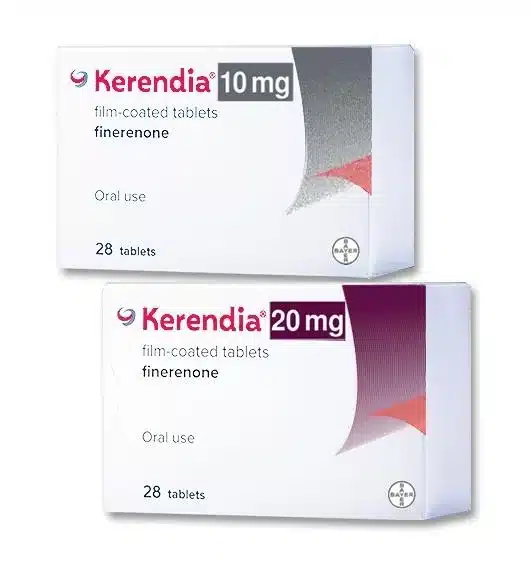Kerendia tablet contains finerenone as its active ingredient, representing a significant advancement in the treatment of chronic kidney disease (CKD) associated with type 2 diabetes mellitus. Finerenone acts as a selective mineralocorticoid receptor antagonist, blocking the binding of aldosterone to the mineralocorticoid receptor and thereby mitigating the detrimental effects of aldosterone on renal and cardiovascular tissues.
Key Features:
- Mineralocorticoid Receptor Antagonist: Finerenone serves as a potent antagonist of the mineralocorticoid receptor (MR), exerting its therapeutic effects by counteracting the harmful actions of aldosterone on the kidneys and cardiovascular system.
- Treatment of CKD in Type 2 Diabetes: Kerendia tablet is indicated for the treatment of adult patients with chronic kidney disease associated with type 2 diabetes mellitus who are at risk of disease progression. It offers a targeted approach to managing CKD in this population, addressing the underlying pathophysiological mechanisms.
- Proteinuria Reduction: Through its action on the mineralocorticoid receptor, finerenone effectively reduces urinary protein excretion (proteinuria), a key marker of kidney damage and disease progression in patients with CKD and type 2 diabetes.
- Cardiovascular Protection: In addition to its renal benefits, finerenone has demonstrated cardiovascular protective effects, reducing the risk of major adverse cardiovascular events such as cardiovascular death, non-fatal myocardial infarction, and non-fatal stroke in patients with CKD and type 2 diabetes.
- Oral Administration: Kerendia tablets are designed for oral administration, with recommended dosages of 10mg and 20mg, to be taken once daily. They can be administered with or without food for convenience.
- Efficacy and Safety: Clinical studies have shown the efficacy and safety of Kerendia in reducing the risk of kidney and cardiovascular events in patients with CKD and type 2 diabetes. Its favorable safety profile makes it suitable for long-term use in eligible patients.
- Patient Education: Patients prescribed Kerendia should receive comprehensive education on proper medication administration, potential side effects, and the importance of adherence to treatment. This empowers patients to actively participate in their healthcare management.
- Consultation with Healthcare Provider: Initiation and monitoring of treatment with Kerendia should be overseen by a qualified healthcare provider experienced in the management of CKD and type 2 diabetes, ensuring optimal therapeutic outcomes and patient safety.
- Access and Affordability: Efforts should be made to ensure equitable access to Kerendia for eligible patients, including exploring financial assistance programs and insurance coverage options to alleviate any financial barriers to treatment






Reviews
There are no reviews yet.